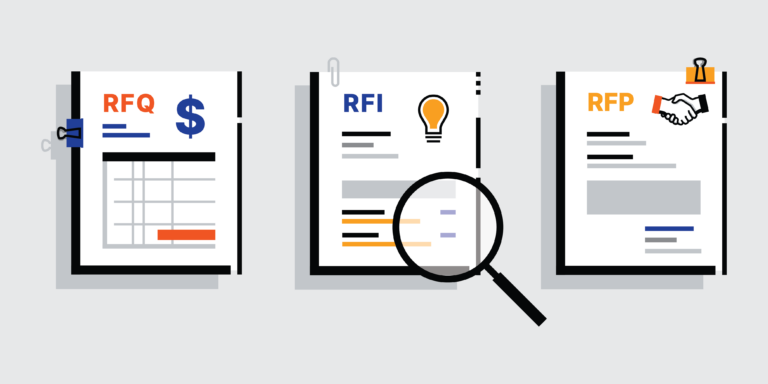— 7 min read
RFQ, RFP, and RFI in Construction: Differences Explained
Last Updated Aug 25, 2023

Requests for qualifications (RFQs), requests for proposal (RFPs), and requests for information (RFIs) are some of the most common requests in the construction industry. Owners, general contractors, and specialty contractors rely on requests like these to get information about design, qualifications, and feasibility throughout the lifecycle of a construction project.
Read on to learn the differences between RFIs, RFQs, and RFPs in construction.
Contents
Table of contents
RFQ vs. RFP vs. RFI
While RFIs, RFQs, and RFPs are all requests, they are used in different situations and different phases of construction.
| Request for qualifications (RFQ) | Request for proposal (RFP) | Request for information (RFI) | |
| Purpose | Gather details about a contractor’s qualifications to work on a specific project | Solicit contractor proposals about cost, schedule, and approach for a specific project | Clarify information about project details, including aspects of the specifications, drawings, and agreements. |
| Phase | Preconstruction | Preconstruction | Preconstruction and construction |
| Flow | Downstream: Owners to Contractors | Downstream: Owners to Contractors | Upstream: Contractors to Design Team |
| Examples | A private developer requests qualifications from a pool of contractors to determine who is eligible to respond to the request for proposal. | A school district building a new elementary school requests proposals from contractors. | A steel contractor requests information regarding an alternative beam to column attachment method from the structural engineer. |
Owners and contractors have specific reasons for employing each of these different types of requests — as well as others, like requests for tender and requests for quote. Below, we’ll give more details about RFQs, RFPs, and RFIs — including some common situations where each type of request is used.
Request for qualifications (RFQ)
Project owners can use a request for qualifications (RFQ) to determine whether a specific contractor has the right experience and eligibility for a particular project.
Project owners solicit bids and or proposals to ensure the best pricing from general contractors and to select a contractor that can complete the project within the budget estimated for the project. However, the lowest bidder is not always qualified to complete the project, so both public and private project owners frequently use RFQs to screen contractors for a project prior to requesting proposals. Contractors respond to an RFQ with a statement of qualifications (SOQ), which demonstrates that they meet the criteria to bid on the project.
With some public projects, owners have a set budget and plan to use a guaranteed maximum price (GMP) contract, so they are able to select a GC solely based on the statement of qualifications.
While RFQs vary from owner to owner and project to project, there are a lot of factors commonly seen on most requests for qualifications, including:
- Proposed team that will manage the project
- Past experience with similar projects
- Suggested approach to completing the project, including information about materials and construction methods.
- Safety stats, like an experience modification rating (EMR).
- Financial information, like cash flow statements or balance sheets
- Insurance or bonding details, like general liability insurance, bid bonds, or performance bonds
- References from other project owners, architects, city officials, developers, or contractors
With these details about contractors, owners and general contractors are better able to make decisions about who to partner with on a complex construction project.
Note: Some construction businesses also use the term RFQ to mean request for quote, which owners and contractors use to get pricing information for changes to original scope, material modifications, or unanticipated site conditions. A request for quote is most often used as part of the financial change management process.
Request for proposal (RFP)
A request for proposal (RFP) is a document used by project owners to solicit proposals from contractors for a specific project.
An RFP helps owners select a construction firm with the appropriate expertise and qualifications to build a project in a timely and cost-conscious manner. By comparing the responses to a request for proposal, project owners can determine which contractor will provide the best partnership and cost for a project.
Sometimes, RFPs are issued early in the design phase. With these types of projects — including design-build (DB) or integrated project delivery (IPD) — the general contractor is involved during the design phase to help ensure the project’s feasibility and budget accuracy. Integrating a general contractor to collaborate during the preconstruction phase often helps alleviate problems with scheduling, budgeting, and design before construction even begins.
An RFP typically asks a general contractor for a proposed fee, construction schedule, and general qualifications. For example, an RFP might request details about the following:
- Cost estimates for the entire project, with the specificity of the estimate varying based on how detailed the construction specifications are when the RFP is sent out
- Tentative project schedule showing how the project will unfold, taking into account all of the required phases and trades
- Qualifications and expertise that the construction firm will bring to the project
- Past projects that highlight the firm’s ability to deliver
- Management and project execution philosophy that outlines how the firm will handle the complexity of the project
- Financial statements demonstrating the firm’s financial health and funds necessary to complete the project
- Safety certifications and program information, which show adherence to the project’s safety scores, protocols, and requirements
- Insurance and bonding information, including typical policies like general liability insurance, as well as bid bonds and performance bonds, which the project may require
The RFP is a key part of the construction bid package as the responses allow project owners to determine which firm to partner with for the project. In some cases, a project owner may use an RFP to engage a construction manager for preconstruction services, including developing a budget, before requesting bids for the project itself. In any case, the goal of an RFP is to get a rough estimate of costs for a specific project and determine which firm is best suited to deliver the project based on cost and expertise.
Request for information (RFI)
A request for information (RFI) is a document sent by contractors to clarify details that are ambiguous or absent in the construction specifications and drawings.
All projects rely on construction documents — like contracts, drawings, and specifications — to ensure that projects are constructed according to plans created by engineers and architects and approved by city building departments. However, unforeseen site conditions may arise — or construction documents can contain conflicting or ambiguous information — which require an engineer’s or architect’s clarification. To properly document amendments to the construction documents, contractors submit RFIs that ultimately receive a clarifying response from the design team or project owner.
Requests for information and the subsequent responses usually fall into one of the following categories:
- Clarifications about the project’s design
- Suggestions or requests for changes or alternate methods
- Questions about potential constructability issues
- Details about a requirement listed in the specifications
- Information about differing site conditions
In all of these cases, RFIs go through a formal process, which often starts with specialty contractors, moves up through the general contractor, and ends with a response from a member of the design team or owner. These requests are cataloged and must be responded to in a contractually specified timeframe.
Overall, requests for information are a core contractual element to almost any construction project and important for keeping construction projects moving along — both during the bidding process and during construction. When contractors have the details they need to provide a bid or perform work, projects move more smoothly.
Why construction requests matter
Construction requests like RFIs, RFQs, and RFPs help businesses get the information they need at every stage of a construction project. Requests help streamline bidding, estimating, project execution, design changes, problem-solving, and more throughout the life of a project.
Owners, general contractors, and specialty contractors need a solid process or software solution for issuing and responding to requests — as outstanding requests can delay projects and run up costs. With a good process in place, requests keep projects moving and enable the efficient flow of information between the many stakeholders involved in a complex construction project.
Categories:
Tags:
Written by
Brad Wagner
Brad Wagner is a seasoned construction professional with an extensive background in the industry. Throughout his career, he’s worked as a foreman, field engineer, project engineer, and process improvement manager at companies like Hensel Phelps and Okland Construction. At Procore, he leverages his experience to help companies optimize their operations using construction software solutions.
View profileDaniel Gray
27 articles
Daniel is an educator and writer with a speciality in construction. He has been writing construction content for Procore since 2022, and previously served as a Procore Content Manager before continuing to pursue an education career as an Assistant Headmaster for Valor Education in Austin. Daniel's experience writing for construction — as well as several clients under an agency — has broadened his knowledge and expertise across multiple subjects.
View profileReviewed by
Ashley Greybar
Ashley Greybar brings seven years of construction experience to her role as Product Marketing Manager, Project Execution at Procore Technologies. Ashley is a specialist in bringing products to market that make it easier for teams to manage projects and comply with construction safety regulations and quality specifications. She is passionate about advancing technology within the construction industry and simplifying complex processes for general contractors, owners, and specialty contractors.
View profileExplore more helpful resources

Bid Security in Construction: How Project Owners & Contractors Benefit
For project owners, the construction bidding process is a complicated and risky endeavor. They want to select the best GC or construction management firm. But even if they identify the...

Successfully Navigating Public-Private Partnerships in Construction
A Public-Private Partnership (PPP or P3) is a contractual agreement that sees government agencies and private companies working together to build major infrastructure projects. Public-private partnerships allow governments to tap...

Invitation to Bid (ITB) Explained for Construction
An invitation to bid (ITB) is an official document issued by a project owner that targets contractors to solicit bids for a construction project. The ITB provides all bidders with...

MasterFormat: The Definitive Guide to CSI Divisions in Construction
Often referred to as the “Dewey Decimal System” of construction, CSI MasterFormat is the industry standard in North America for organizing construction specifications. This system enables owners, designers and contractors...
